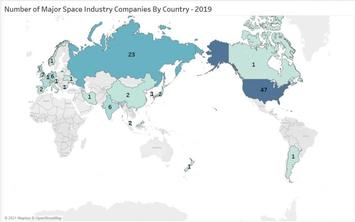
It's impossible to predict the future. But one thing you can be sure of: few things will be more important to the lives of our children than who wins the emerging, epoch-defining struggle for control of space.
This is a battle just beginning over who will control the communication satellites so central to our economy, as well as the vast resources of other planets. But ultimately, the new space battle represents a war over opportunities for colonization, for an increasingly resource-stretched and crowded earth.
This may sound like apocalyptic sci-fi. But space is already becoming big business, and it's certain to get much bigger. Boosted by a huge surge of investment, space-industry global revenues are up more than twofold since the early 2000s, from $175 billion in 2005 to almost $424 billion in 2019. By 2040, Morgan Stanley projects annual global space-industry revenues to reach $1.2 trillion.
Today the big money—$271 billion of it—is in communications satellites and launch services. Soon enough, there may be a market for things like space tourism, manufacturing in space and even, eventually, the old dream of colonization.
But in the long run, the key struggle will be over military applications, and, perhaps even more critical, control of valuable resources. The monetary potential in mining key resources like lithium, cobalt and gold has been estimated to be as high as 27 quintillion dollars.
But the space war is not just about money. It's also about power. And America faces a challenge on the galactic front from China, Russia, the European Union, Japan, and even Israel. And as Brandon Weichert notes in his book Winning Space: How America Remains a Superpower, America's claim to being the world's superpower rests to a large degree on winning the space front.
Right now, military advantage clearly remains a prime motivator. Control of satellites is crucial to any future conflict, as militaries depend on satellite communications for both surveillance and battlefield operations. The winner of future "star wars" will be those who can control access to space.
Unfortunately for the U.S., China is very aware of this. Ye Penjiang, the head of its moon program, views space from an imperial perspective, comparing it to the islands China is occupying or creating in the South Seas. Penjiang has gone so far as to suggest that China's "descendants" would never forgive them for giving up this new realm.
So it's not surprising that Chinese young people now dream of being astronauts, like Americans in the 1960s, while most of our young people seem more interested in becoming social media influencers, more like Justin Bieber than Buzz Aldrin as Weichert archly put it.
Read the rest of this piece at Newsweek.
Joel Kotkin is the author of The Coming of Neo-Feudalism: A Warning to the Global Middle Class. He is the Presidential Fellow in Urban Futures at Chapman University and Executive Director for Urban Reform Institute. Learn more at joelkotkin.com and follow him on Twitter @joelkotkin.
Marshall Toplansky is a clinical assistant professor of management science at the Argyros School of Business and Economics at Chapman University. He is a research fellow at the university’s Hoag Center for Real Estate and Finance and at the Center for Demographics and Policy.












